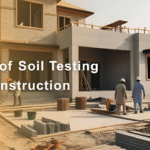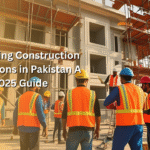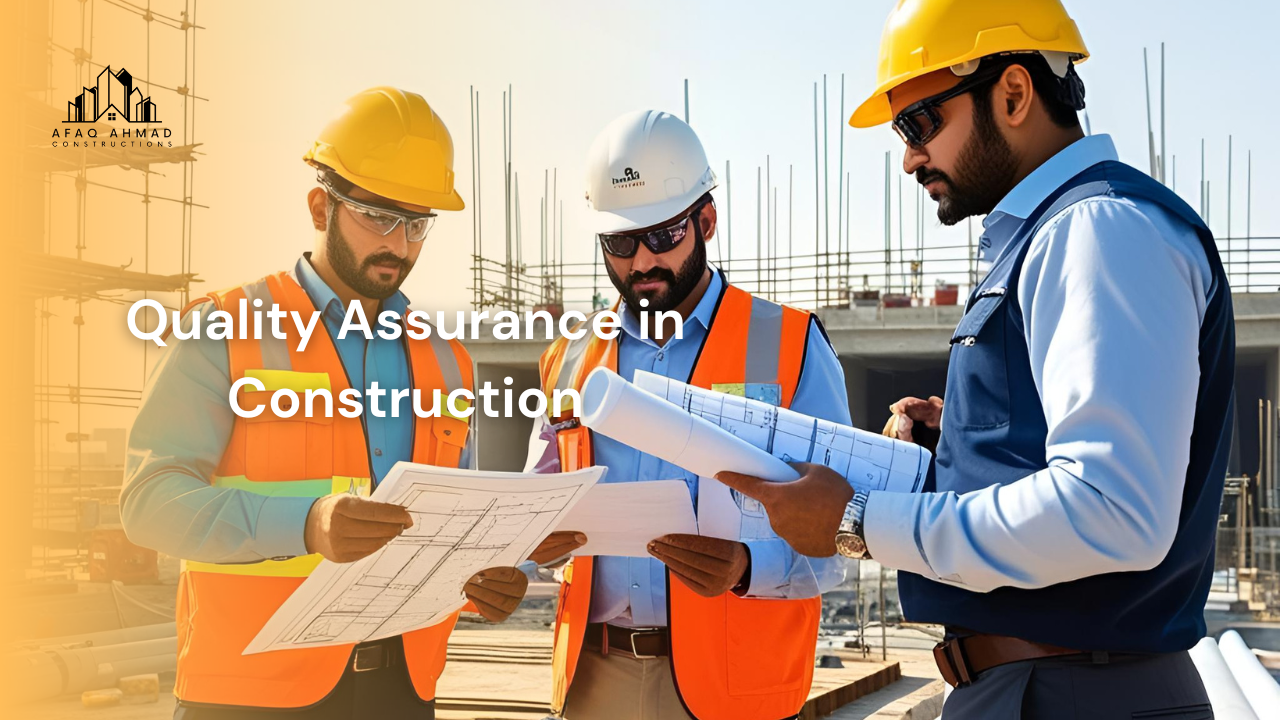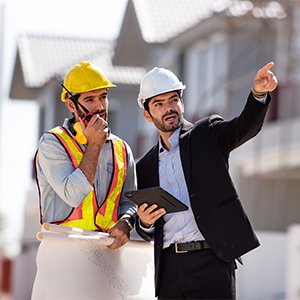
The Role of Soil Testing in Construction – Why It Matters in Pakistan
May 22, 2025
Navigating Construction Regulations in Pakistan: A 2025 Guide
May 24, 2025
As the construction industry in Pakistan continues to grow in 2025, ensuring quality in every project has become more critical than ever. Lahore is bustling with construction activity, from new homes in DHA Lahore to commercial developments in Bahria Town. At Afaq Ahmad Constructions, we understand that quality assurance (QA) is the backbone of any successful construction project, providing the trust and confidence that clients need in a competitive market. In this blog, we’ll explore quality assurance in construction you can trust, delving into its importance, processes, and practical applications in Pakistan, ensuring your projects in Lahore and beyond are built to last.
What Is Quality Assurance in Construction?
Quality assurance in construction refers to the systematic process of ensuring that a project meets predefined standards, specifications, and client expectations throughout its lifecycle. Unlike quality control (QC), which focuses on identifying defects after they occur, QA is proactive, aiming to prevent issues before they arise. It encompasses everything from material selection and compliance with regulations to worker training and project management, ensuring that the final structure is safe, durable, and functional.
In Pakistan, where the construction sector is a key economic driver—projected to grow at an annual average rate of over 5% from 2025 to 2028—QA is essential for addressing challenges like material shortages, labor issues, and environmental risks. By embedding QA into every phase of a project, builders can deliver structures that stand the test of time, whether it’s a luxury villa in Lake City Lahore or a smart home in Lahore Smart City.
Why Quality Assurance Matters in Pakistan
Pakistan’s construction landscape is diverse and dynamic, but it faces unique challenges that make QA indispensable:
1. Ensuring Safety and Structural Integrity
Pakistan’s varied climate, from Lahore’s scorching summers to the seismic risks in northern regions, demands structures that can withstand environmental stresses. QA ensures that materials, designs, and construction practices meet safety standards, reducing the risk of failures like foundation settlement or structural collapse. For instance, our recent blog on soil testing highlighted how geotechnical analysis—a key QA step—prevents foundation issues in DHA Lahore projects.
2. Meeting Regulatory and Client Expectations
In Pakistan, compliance with building codes, such as those set by the Lahore Development Authority (LDA), is mandatory for obtaining permits and approvals. QA ensures that projects adhere to these regulations, avoiding delays or penalties. Additionally, clients in 2025 are more informed and expect high-quality finishes, as seen in the minimalist and biophilic design trends we discussed in our construction design trends blog. QA bridges the gap between expectations and delivery, ensuring client satisfaction.
3. Cost Efficiency and Risk Mitigation
Poor quality can lead to costly repairs, delays, and legal disputes. QA minimizes these risks by identifying potential issues early—whether it’s substandard materials or improper construction techniques—saving time and money in the long run. In a market facing rising material costs and a 4.4% contraction in 2024, as noted in recent industry reports, QA is a strategic tool for optimizing resources and maintaining project budgets.
4. Enhancing Reputation and Market Competitiveness
In Lahore’s competitive real estate market, a reputation for quality can set a construction firm apart. Societies like Bahria Town and Lahore Smart City attract discerning buyers who prioritize durability and aesthetics. By consistently delivering high-quality projects, companies like Afaq Ahmad Constructions build trust and loyalty, positioning themselves as leaders in the industry.
Key Components of Quality Assurance in Construction
Quality assurance in construction involves a comprehensive framework that ensures excellence at every stage. Here’s how it’s implemented in Pakistan in 2025:
1. Pre-Construction Planning and Design Review
QA begins before a single brick is laid, with thorough planning and design validation:
- Soil Testing and Site Analysis: As discussed in our soil testing blog, understanding the site’s geotechnical properties ensures a stable foundation. In Lahore, where soil conditions vary widely, this step is non-negotiable.
- Design Compliance: Reviewing architectural and structural designs against local building codes and client requirements. In 2025, the use of Building Information Modeling (BIM), a trend we highlighted in our construction design blog, enhances design accuracy by identifying clashes before construction begins.
- Material Selection: Sourcing high-quality materials that meet standards like those set by the Pakistan Standards and Quality Control Authority (PSQCA). For example, ensuring concrete has the correct compressive strength for a multi-story building in DHA Lahore.
2. Material Testing and Quality Control
Materials are the backbone of any construction project, and QA ensures they meet rigorous standards:
- Concrete Testing: Conducting slump tests and compressive strength tests to verify concrete quality. In Lahore, where summer heat can affect curing, QA ensures proper mix designs and curing processes.
- Steel Reinforcement: Checking steel bars for tensile strength and corrosion resistance, critical for seismic zones in northern Pakistan.
- Sustainability Focus: Using eco-friendly materials like recycled wood or low-VOC paints, aligning with the sustainable design trends popular in 2025.
Local firms like Building Standards Limited in Pakistan offer material testing services, ensuring compliance with international standards like ASTM and ISO, which are increasingly adopted in Lahore’s premium projects.
3. Worker Training and Skill Development
A skilled workforce is essential for quality construction. In Pakistan, where labor shortages are a challenge, QA includes:
- Training Programs: Regular workshops on modern construction techniques, such as modular construction or smart home integration, trends we’ve explored in previous blogs.
- Safety Protocols: Ensuring workers follow safety standards to prevent accidents, which can compromise quality and delay projects.
- Supervision: On-site supervisors monitor workmanship, ensuring that tasks like masonry, plastering, and plumbing meet specifications.
4. On-Site Inspections and Monitoring
Regular inspections are a cornerstone of QA, ensuring that construction aligns with plans:
- Milestone Inspections: Checking at key stages, such as foundation laying, structural framing, and roofing. In Lahore Smart City, QA teams use drones to monitor progress, a trend noted in 2025 industry reports.
- Checklist Adherence: Using detailed checklists to verify elements like alignment, leveling, and finishing quality.
- Technology Integration: Leveraging tools like laser scanning and IoT sensors to detect deviations in real-time, ensuring precision in projects like those in Bahria Town.
5. Documentation and Reporting
QA requires meticulous documentation to track progress and ensure accountability:
- Daily Reports: Logging activities, issues, and resolutions to maintain transparency.
- Test Reports: Compiling results from material and soil tests, as well as structural assessments.
- Client Updates: Providing regular updates to clients, building trust through clear communication, a practice we prioritize at Afaq Ahmad Constructions.
6. Post-Construction Quality Checks
QA doesn’t end when construction does—it extends to the handover phase:
- Snag List Creation: Identifying and fixing minor defects, such as uneven plastering or paint smudges, before handover.
- Final Inspections: Ensuring all systems—plumbing, electrical, HVAC—function as intended, especially in smart homes with automated systems.
- Warranty and Support: Offering post-construction support to address any issues, ensuring long-term client satisfaction.
Quality Assurance in Lahore’s Housing Societies
Lahore’s housing societies, as explored in our blog on top societies for investment in 2025, are prime examples of where QA makes a difference:
DHA Lahore
Known for luxury homes, DHA Lahore projects require rigorous QA to ensure structural integrity and high-end finishes. QA processes here include soil testing for filled plots, concrete testing for multi-story buildings, and inspections for compliance with LDA standards, ensuring homes meet the expectations of high-income buyers.
Bahria Town Lahore
With iconic structures like the Eiffel Tower replica, Bahria Town demands QA to maintain its reputation. Material testing for durability, especially for external features exposed to Lahore’s climate, and on-site inspections for finishing quality are critical to delivering the promised lifestyle.
Lahore Smart City
As a tech-driven society, Lahore Smart City integrates QA with smart technology. IoT sensors monitor construction progress, while QA ensures that smart villas are built on stable foundations, tying into the soil testing practices we discussed. This ensures both functionality and longevity.
Challenges in Implementing Quality Assurance in Pakistan
While QA is essential, implementing it in Pakistan comes with challenges:
- Cost Constraints: Small developers may view QA as an added expense, but as we’ve noted, it saves costs by preventing rework. In 2025, firms like ours are offering cost-effective QA packages to address this.
- Lack of Skilled Labor: The labor shortage in Pakistan, exacerbated by a 4.4% market contraction in 2024, affects quality. QA mitigates this through training and supervision, ensuring consistency.
- Regulatory Gaps: While LDA and other authorities enforce standards, smaller projects often bypass QA. Advocacy for mandatory QA protocols is growing, especially in seismic zones.
- Supply Chain Issues: Material shortages can lead to substitutions with substandard products. QA ensures that all materials meet specifications, even in a volatile market.
The Future of Quality Assurance in Pakistan
In 2025, the future of QA in Pakistan is bright, driven by technological advancements and a focus on sustainability:
- Technology Integration: The use of BIM, drones, and AI for real-time monitoring is transforming QA, as noted in our construction design trends blog. These tools enhance precision and efficiency, particularly in large-scale projects under the China-Pakistan Economic Corridor (CPEC).
- Sustainability Focus: QA is aligning with sustainable practices, ensuring that materials and methods reduce environmental impact, a trend we’ve seen in green building designs.
- Regulatory Evolution: There’s a push for stricter QA regulations, especially for public infrastructure, ensuring safety and durability across all projects.
How Afaq Ahmad Constructions Ensures Quality Assurance
At Afaq Ahmad Constructions, QA is at the heart of everything we do. Here’s how we ensure quality you can trust:
- Comprehensive Testing: From soil testing to material analysis, we partner with leading firms to ensure every component meets standards.
- Expert Supervision: Our experienced engineers and supervisors monitor every stage, ensuring compliance with designs and regulations.
- Client-Centric Approach: We provide transparent reporting and regular updates, keeping you informed and confident in the process.
- Post-Construction Support: Our commitment doesn’t end at handover—we offer warranties and maintenance support to ensure your project remains flawless.
Whether you’re building in DHA Lahore, Bahria Town, or Lahore Smart City, we deliver quality assurance that gives you peace of mind.
Conclusion
Quality assurance in construction is the foundation of trust, ensuring that projects in Pakistan are safe, durable, and meet client expectations. In 2025, as Lahore’s construction sector thrives, QA is more important than ever, addressing challenges like climate, cost, and compliance while leveraging technology for precision. By prioritizing QA, you can build with confidence, knowing your investment will stand the test of time. At Afaq Ahmad Constructions, we’re here to make that happen, delivering quality you can trust in every project.
Ready to build with confidence? Contact Afaq Ahmad Constructions today for quality assurance that sets the standard in Lahore and beyond.





